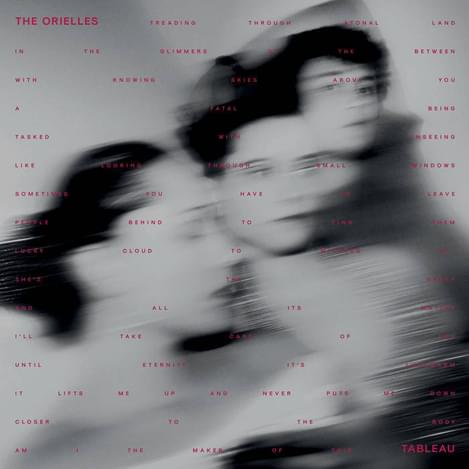The Orielles shift their sound into the brave and brilliant on Tableau
"Tableau"

After breaking through with their second album, Disco Volador in 2020, Halifax trio The Orielles unable to cement the success due to the pandemic restrictions quickly sidestepped a continuation of the indie-disco pop thing they did so well and made a surprising switch into something more esoteric.
Scoring their own film La Vita Olistica, the accompanying soundtrack was a collection of atmospheric mood pieces and reworks of music from their previous album with the hooks dialled back indicating they weren't just a catchy pop band with the skill of creating earworm choruses, yes, they can still do that fizzy pop thing, but it’s time for something a little more understated.
Tableau, their fourth album, is a further exploration into those capabilities. It's an immersive listen, one of those records that gently entices you to experience its charms, the dreamlike state taking over before gently placing you back in the place you were when it begun one hour prior.
Although fans of the three-piece will be able to identify this being an album by The Orielles, particularly through the gorgeous vocals Esme Dee Hand-Halford who is on wonderful form throughout, the Orielles sound of old only peaks through intermittently, on Tableau they look inwards to innovate and take a significant turn to the leftfield with a surprising level of grace.
The hazy warmth of "Chromo II" is a striking piece of early '90s shoegaze, the complex jazz inflected drums and jagged guitar chords of ‘Airtight’ is an otherworldly piece of Kid A post rockism which slowly builds into a crescendo of noise before breaking into a grinding piece of dark disco. Also looking to Radiohead, "The Room" deploys the same technique they used on their instant classic "Weird Fishes", propulsive live drum and bass building in intensity throughout in a moment that’s both emotive and captivating, while the persistent funky bass which underpins "The Instrument" manages to be as light as a feather, while also being a driving piece of danceable krautrock.
All of that is peak Orielles. But we already know about their ability there, the album really excels when they delve into more improvisational sounds. Bands such as Disco Inferno, Bowery Electric, Seefeel and Bark Psychosis breathed life into a dying UK shoegaze scene back in the mid to late '90s with a fusion of ambient, neo-classical, trip-hop and jazz, and whether The Orielles are aware of those bands or not, Tableau really slots itself into that scene when they move into the experimental.
"The improvisation" is a sprawling eight-minute excursion into jazz percussion fused with soundtracky strings and piano, the warm electronic throb and guitar reverb of "Some Day Later" is a hallucinatory piece of beauty which deserves a significant beyond its too short playing time. On "Honefleur Remembered" Hand-Halford’s barely there, almost catatonic vocal is joined with a trancelike piano chord and an elastic bassline which is so cosy and inviting.
Little shifts such as on "Beams" are subtle but effective, starting as barely awake sleep-funk, halfway through switching to a string drenched piece of dreampop before shattering itself into languid swathes of ambient synth-work, before rebuilding into a closing segment of drowsy thrash.
The progression from their previous material to this really cannot be understated. The advance is huge, widescreen in its intention, but with sleepy eyes, awake, but still in a dream. Tableau follows in a long line of unexpected shifts in sound, like Kid A, like Slowdive’s Pygmalion, like Talk Talk’s Spirit of Eden. Delicate and crystalline in sound & execution, what we have here is brave, innovative, unexpected, and brilliant.
Get the Best Fit take on the week in music direct to your inbox every Friday

Tunde Adebimpe
Thee Black Boltz

Julien Baker & TORRES
Send A Prayer My Way

Bon Iver
SABLE, fABLE





